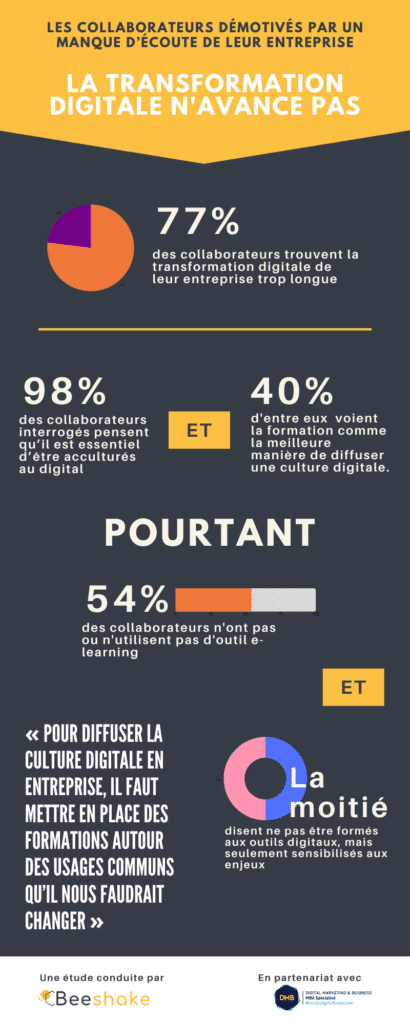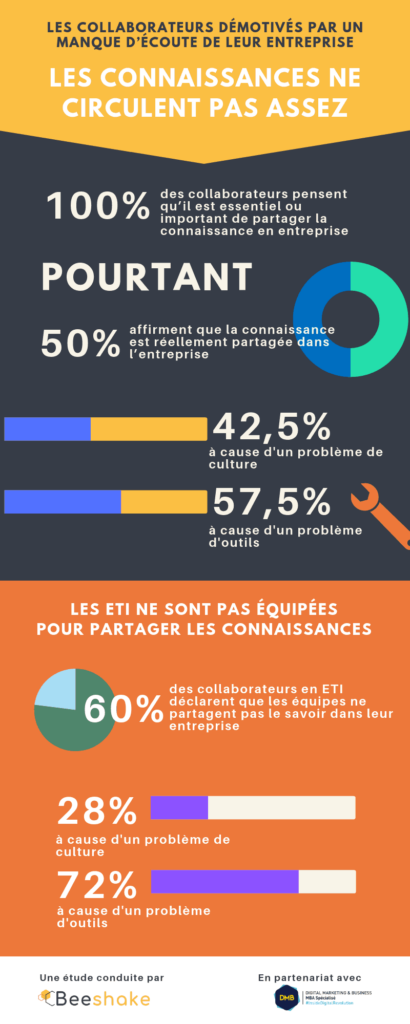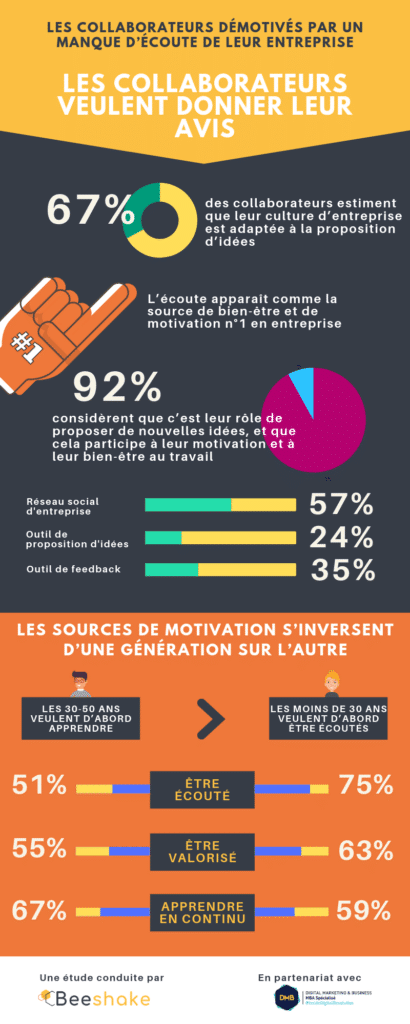91% of employees would feel more motivated if they could bring their ideas to the company. However, almost 70% of them cannot do so.
Beeshake presents the results of its study on the impact of digital transformation on employee motivation and engagement. After 5 months of study and 250 employees surveyed, the results underline a digital transformation that takes too long and is not accompanied by real changes in usage. However, employees, especially Millennials, are asking for training, feedback, knowledge sharing andcollaborative innovation tools to feel good and motivated at work.
Digital transformation, fine words, little concrete action?

There is no doubt that the digital transformation has been launched in a majority of companies. 85% of employees surveyed believe that their company has initiated a digital transformation. However, not everything is rosy: 77% of them feel that this transformation is taking too long and is sometimes superficial.
The study shows that employees are waiting to move beyond "awareness" and into a much more concrete digital culture. They want to learn new uses. Moreover, 40% see training as the best way to spread the digital culture.
"In order to dTo spread the digital culture in companies, we need to set up training courses on the common practices that we need to change", emphasised one survey respondent.
But the expected training is not always forthcoming. 54% of employees say that they do not have or do not use any e-learning tools. This figure is confirmed by 50% of them who say that they are not trained in the tools, but only aware of the challenges of digital technology.
Employees do not have the tools to circulate knowledge

All employees agree that the dissemination of knowledge within the company is essential. Nevertheless, half of them think that knowledge is not really shared in their company. And for the majority of them (57.5%), it is not a problem of culture but a problem of tools. Or rather the lack of tools! Contrary to popular belief, if employees do not share their know-how enough, it is becausethey do not have the tools to do so, and not only because the corporate culture does not lend itself to it.
This trend is even stronger in SMIs. 60% of employees in SMIs deplore the lack of knowledge sharing, and 72% blame the lack of suitable tools. SMIs would therefore be ready to use their digital transformation to share knowledge, but have not made this a reality by implementing suitable tools.
Employees want to bring their ideas to the company, but cannot do so
Employees are ready to propose new ideas, and say so loud and clear. 92% believe that it is their role to propose new ideas to the company, 91% believe that this would motivate them more, and 67% believe that they have a mature company culture. However, the lack of tools prevents this maturity from being transformed into a concrete culture.

Indeed, companies have not invested in tools dedicated to feedback and idea generation. Only 24% have an idea proposal system and 35% have a feedback tool. They clearly prefer more traditional tools: intranet, newsletter, internal news site.
This is a pity, given that being listened to appears to be the primary source of motivation and well-being at work for employees. This is an expectation held by Millennials who want their ideas to be heard, more than the generations before them.
"Employees are waiting to experience the new digital uses in practice. Of course, the question is cultural. But a digital culture is an empty shell if it is not accompanied by a concrete experience. In this case, the experience of tools that transform the experience at work. »
Cécile Le Galès, CEO of Beeshake
Methodology
Survey conducted online from 7 January 2019 to 31 March 2019 among 250 employees in companies throughout France. Respondents were classified by age group (40% under 30, 43% 30-50, 17% over 50), and by company size (39% in SMEs, 36% in ETIs and 25% in companies with more than 5000 employees).
A survey conducted in partnership with the consultants of EFAP's Specialised MBA: Digital Marketing & Business.
Find the press release in the Press section.